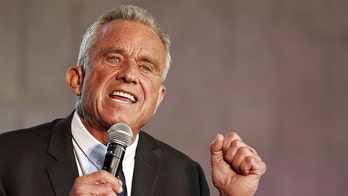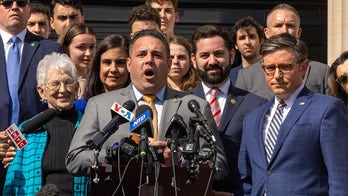
Sen. Blanche Lincoln, D-Ark., greets supporters as her husband Steve, left, watches as the senator claimed victory in the Democratic primary runoff election in Little Rock, Ark., Tuesday, June 8, 2010. (AP)
Sen. Blanche Lincoln, one of the chief architects of the financial-regulation overhaul nearing completion in Congress, is pushing for a change that would benefit a bank in her home state of Arkansas.
The bank, Arvest Bank Group Inc., of Bentonville, Ark., is predominantly owned by the Walton family, of Wal-Mart Stores Inc. fame, perhaps the most influential family in the state and one of the richest in the U.S.
Under Ms. Lincoln's proposed change, Arvest would be excused from a provision that could require banks to raise more capital, in Arvest's case about $115 million. Other Senate Democrats had intended only to exempt banks with less than $10 billion in capital from the provision. Ms. Lincoln wants to raise that to $15 billion, a threshold that would exempt Arvest. It is the only bank in Arkansas with between $10 billion and $15 billion of assets, though there are some in other states.
White House officials have said they don't want changes that benefit specific companies, leery of the horse-trading that nearly sank their health-care overhaul. But the administration also can't afford to alienate Ms. Lincoln, head of the Senate Agriculture Committee, whose support on the broader overhaul is vital to its success.
Lawmakers routinely do things to benefit organizations in their home states, often seen as "constituent service." But Ms. Lincoln's move could cause headaches for other Democrats because Arvest is owned by such a wealthy and politically influential company. Other Democrats in Congress are considering making a change to satisfy the senator, people familiar with the matter said.
A spokeswoman for Ms. Lincoln said she was pushing the change to make sure "no Arkansas bank—no matter its owner—is punished" by the provision." She didn't discuss the issue with anyone from the Walton family but did meet with Arvest officials, her office said.
Arvest officials and the Walton family declined to comment. The company is the largest of 96 bank holding companies in Arkansas and has more than 200 branches in four states.




